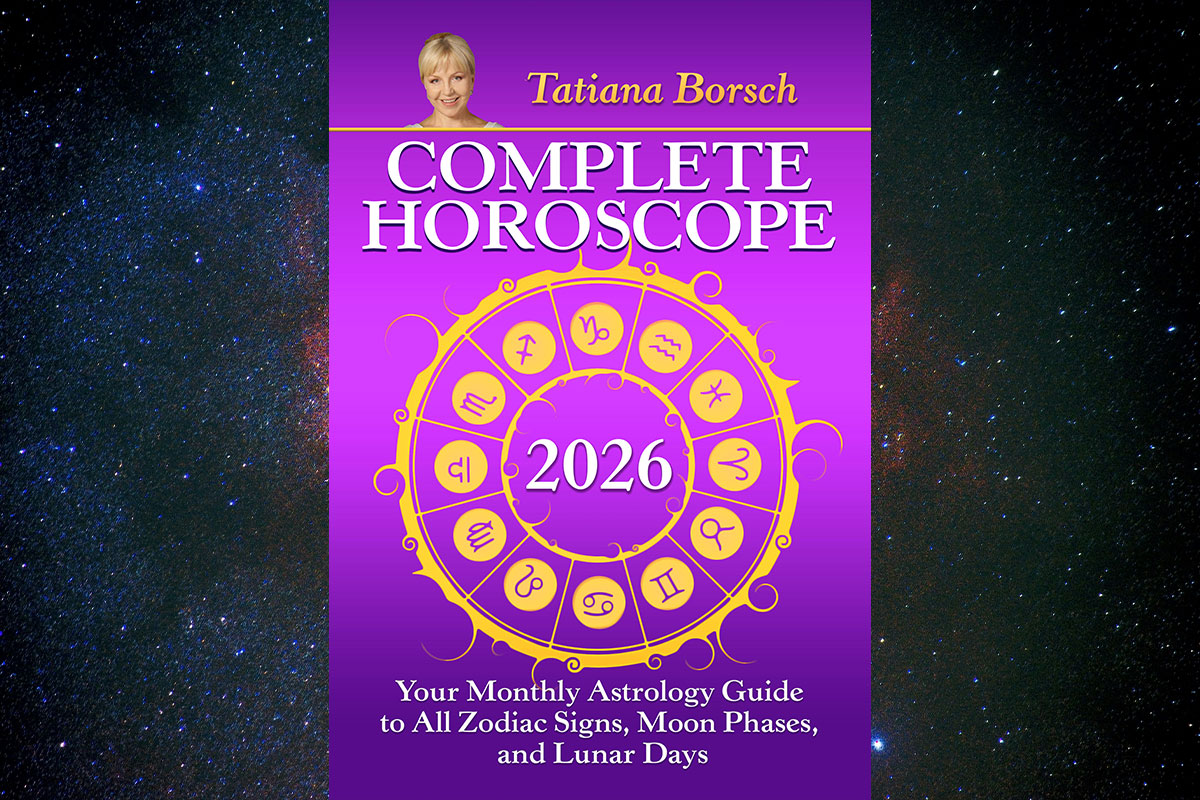
2026 Astrology Predictions: Major Planetary Cycles and Their Impact on Markets, Geopolitics and Innovation
Tatiana Borsch draws historical parallels and examines how 2026’s powerful celestial cycles may influence currencies, energy markets, global power shifts and technological breakthroughs.
Tatiana Borsch, a distinguished astrologer with more than 40 published books examines the planetary dynamics shaping 2026. Drawing on her latest work, Complete Horoscope 2026 (available on Amazon), Borsch evaluates major transits through a historical lens, offering insights into how they may influence global economics, politics, technology and social development.
As the Age of Aquarius, which began in 2020, continues to redefine collective priorities, 2026 stands out as a notably transformative year. Rare alignments among the outer planets — Neptune moving from Pisces into Aries, Pluto from Capricorn into Aquarius, Uranus from Taurus into Gemini and Saturn entering Aries — mark a period of deep structural change. These slow-moving planets often correspond with shifts in governance, ideology, financial systems and technological innovation, making this forecast highly relevant for forward-thinking readers.
To understand what these transits may signal, Borsch turns to historical precedents. Pluto’s previous passage through Aquarius (1777–1799) coincided with the American Revolution, the adoption of the U.S. Constitution in 1787 and George Washington’s presidency beginning in 1789. His emphasis on economic development and caution toward foreign entanglements echoes current themes surrounding trade, self-reliance and conflict reduction.
In France, the Revolution of 1789 reflected Aquarian pressures for systemic change, culminating in the establishment of the First Republic. Borsch notes that several of today’s social tensions in France resemble the same structural strains. Great Britain, after losing the American colonies and granting broader autonomy to Ireland in 1782, underwent its own internal restructuring. Meanwhile, Catherine the Great’s reforms expanded Russia’s influence, integrated new territories and reshaped demographic patterns — developments Borsch compares with modern geopolitical processes.
Pluto’s current transit through Aquarius, continuing until 2044, is expected to activate similar themes. Just as important is Neptune’s ingress into Aries on 26 January 2026, a cycle last seen between 1861 and 1874. Neptune governs ideology, medicine, religion, creativity and, in difficult alignments, fanaticism or illusion. Its previous passage through Aries aligned with major ideological shifts, including the U.S. Civil War, the Paris Commune of 1871 and the Great Reforms in the Russian Empire. While history does not repeat precisely, Borsch notes that comparable patterns tend to echo across eras, though the current planetary configuration suggests more constructive trajectories.
In economics, Borsch anticipates an acceleration of multipolarity, a redistribution of global resources and a gradual reduction of dollar dominance as more countries conduct transactions in national currencies. BRICS-related initiatives may gain momentum. The digitisation of money will continue to advance, with Bitcoin and other digital assets likely experiencing heightened demand under Pluto’s financial influence.
Jupiter in Cancer (mid-2025 to mid-2026) highlights real estate, agriculture, family expansion and healthcare. This may stimulate home purchases, renovations and increased consumer spending, though overextension could lead to later corrections. When Jupiter moves into Leo in mid-2026, attention shifts to luxury goods, entertainment, tourism, the arts and major sporting events. Ambitious, highly visible projects will flourish, and gold prices may rise sharply due to Leo’s association with speculation and dramatic financial cycles.
Politically, Borsch foresees heightened visibility for charismatic leaders and a rise in populist sentiment. This can energise civic participation but may also deepen divisions. In the United States, economic pressures may persist, though increased spending will offer partial improvements. Efforts to reduce international conflicts and recalibrate strategic relationships may take shape, with fluctuations in U.S.–China and U.S.–Russia dynamics. Natural disasters — floods, wildfires, tornadoes — will remain a concern.
Across Europe, economic challenges and social tensions that began in 2022 may intensify. Protests, migration debates and widening gaps between policymakers and citizens are likely. In the United Kingdom, nationalist sentiment may grow, and discussion around Northern Ireland’s status may re-emerge.
Russia is expected to prioritise technological and financial self-reliance, deepening cooperation with China and India while rebuilding regions affected by the conflict.
Astrological indicators point to the conflict Ukraine entering its final phase, with signs of de-escalation becoming more visible in next year. In 2026, isolated clashes may continue, but large-scale operations appear unlikely. The charts suggest that negotiations could develop in a framework where one side holds significantly stronger leverage, shaping the eventual settlement.
Ukraine’s horoscope also shows potential leadership instability, with configurations often associated with abrupt political transitions or unexpected departures from office, particularly from end-2025 onward. Longer-term planetary patterns indicate financial strain, demographic decline and territorial restructuring, with more sustainable recovery likely beginning only around 2028–2029. External partners may continue offering support, though the charts imply that resource limitations could influence the pace and form of future agreements.
In the Middle East, Israel is expected to focus on reconstruction with significant international backing. Regional tensions may remain contained in 2026 but could intensify later in the decade.
Technologically, 2026 may be a breakthrough year. Uranus in Gemini favours rapid progress in digital education and communication, potentially reducing emphasis on traditional models. Artificial intelligence will advance dramatically, raising both opportunities and concerns about societal dependence. Neptune supports medical innovations, plant-based health trends and new treatments for conditions previously considered incurable. Automation is poised to expand across industries.
Borsch frames 2026 as a catalyst for renewal — a year in which historical patterns meet emerging opportunities. For detailed forecasts for every zodiac sign, readers can explore Complete Horoscope 2026.
About Tatiana Borsch
Tatiana Borsch is an internationally respected astrologer, author and columnist with more than 40 books published, including the long-running Complete Horoscope series. Over her 30-year career, her annual forecasts have earned global recognition for their depth, accuracy and historical analysis. Her books are published worldwide and available on Amazon and major retailers.



 Bitcoin
Bitcoin  Ethereum
Ethereum  Tether
Tether  XRP
XRP  USDC
USDC  Solana
Solana  TRON
TRON  Lido Staked Ether
Lido Staked Ether  Cardano
Cardano  Avalanche
Avalanche  Toncoin
Toncoin